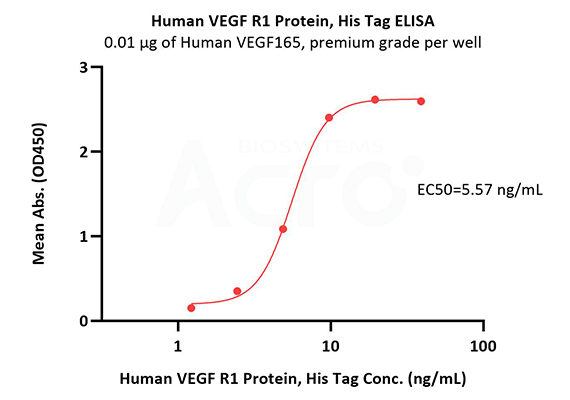
Leave message
Can’t find what you’re looking for?
Fill out this form to inquire about our custom protein services!
Inquire about our Custom Services >>


































 Request a FREE Sample of our FcRn Binding Kit!
Request a FREE Sample of our FcRn Binding Kit! Request a FREE Sample of our FcRn Binding Kit!
Request a FREE Sample of our FcRn Binding Kit!
 Limited Edition Golden Llama is here! Check out how you can get one.
Limited Edition Golden Llama is here! Check out how you can get one.  Limited Edition Golden Llama is here! Check out how you can get one.
Limited Edition Golden Llama is here! Check out how you can get one.
 Request a FREE sample of our GMP products!
Request a FREE sample of our GMP products!  Request a FREE sample of our GMP products!
Request a FREE sample of our GMP products!
> VEGF: Cutting off tumor's feeding channel 
Not only vascular endothelial growth factor (VEGF) plays a role in promoting angiogenesis and regeneration, but shows multiple functions such as immune regulation and neuroprotection. VEGF family members exert their effects through interactions with a family of three VEGF receptors. VEGF is up-regulated when it overexpressed in many tumors. Therefore, it becomes a hot target of drug development for tumors.
Currently, there are more than 100 antibody drugs, such as monoclonal antibodies (mAb) and bispecific antibodies (BsAb) against VEGF are widely-used for clinical treatment.
Given its significant role in multiple cancer types, including tumors, intraocular neovascular disorders and other cardiovascular diseases, there is no surprise that VEGF has been heavily studied for new target therapeutics.
ACROBiosystems has developed a variety of VEGF proteins with different molecules, subtypes, species, and tags to help expedite your antibody drug development. All SPR&BLI protocols are available for free.
VEGF-A
VEGF-B
VEGF-C
VEGF-D
VEGF R1
VEGF R2
VEGF R3
| Molecule | Cat. No. | Species | Product Description | Structure |
|---|
| Molecule | Cat. No. | Species | Product Description | Structure |
|---|
| Molecule | Cat. No. | Species | Product Description | Structure |
|---|
| Molecule | Cat. No. | Species | Product Description | Structure |
|---|
| Molecule | Cat. No. | Species | Product Description | Structure |
|---|
| Molecule | Cat. No. | Species | Product Description | Structure |
|---|
| Molecule | Cat. No. | Species | Product Description | Structure |
|---|
>>>If you have any questions, suggestions or comments about VEGF, please contact us.
>>> Click here to find out more hot targets for bispecific antibodies.
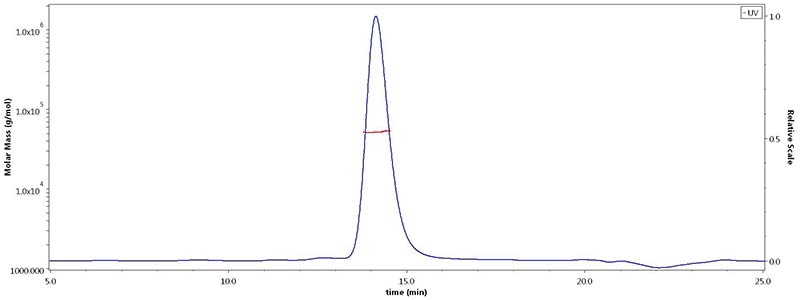
The purity of ActiveMax® Human VEGF165, Tag Free (MALS verified) (Cat. No. VE5-H4210) is more than 95% in HP-SEC, and the molecular weight of this protein is around 40-55 kDa verified by SEC-MALS.
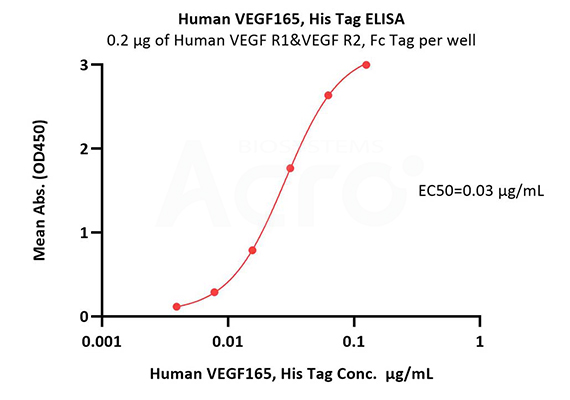
Immobilized Human VEGF R1&VEGF R2, Fc Tag at 2 μg/mL (100 μL/well) can bind Human VEGF165, His Tag (Cat. No. VE5-H5248) with a linear range of 0.004-0.063 μg/mL (QC tested).
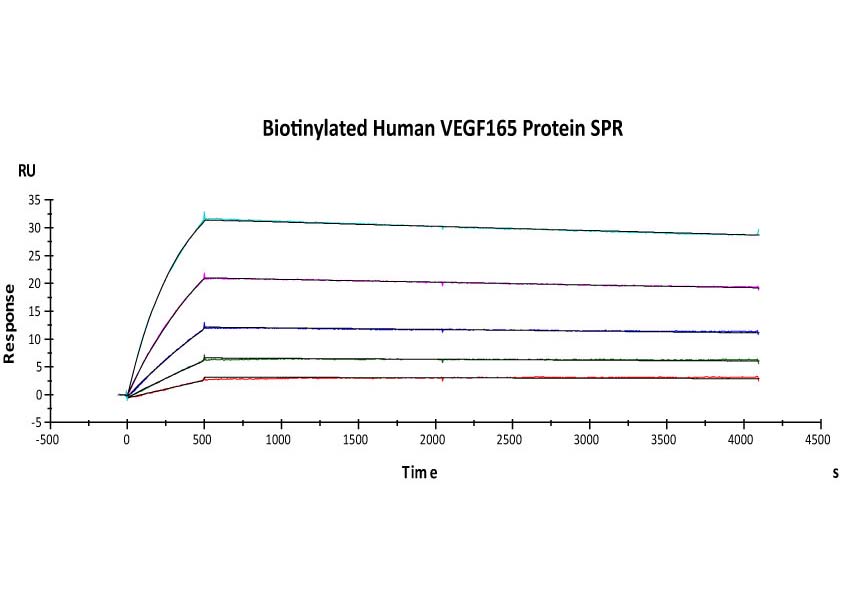
Immobilized Biotinylated Human VEGF165, His,Avitag (Cat. No. VE5-H82Q0) on CM5 Chip via Streptavidin, can bind Avastin with an affinity constant of 0.417 nM as determined in SPR assay (Biacore T200) (Routinely tested).

Loaded Avastin (Bevaciz*mab) on AHC Biosensor, can bind Human VEGF165, His Tag (Cat. No. VE5-H5248) with an affinity constant of 0.448 nM as determined in BLI assay (ForteBio Octet Red96e) (Routinely tested).
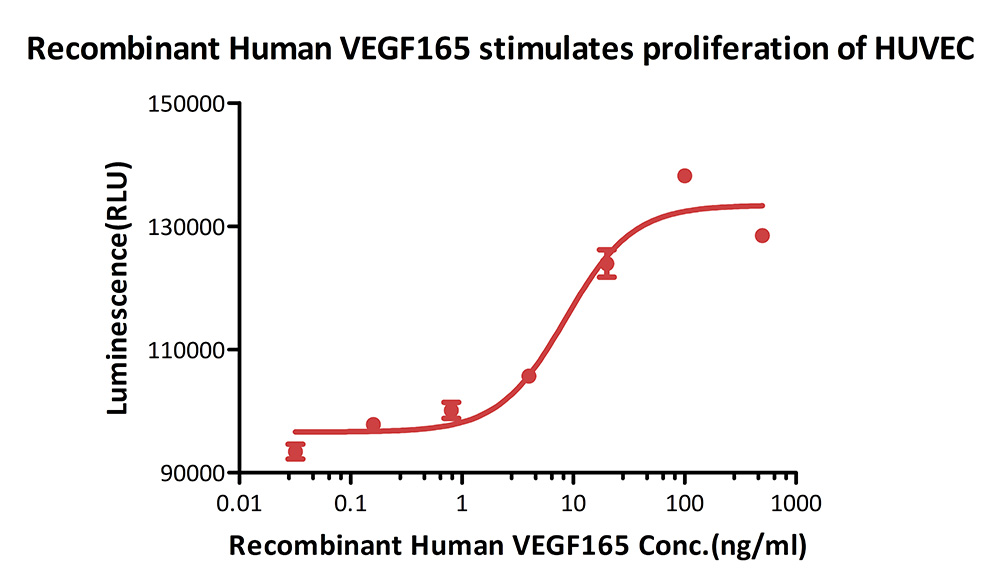
ActiveMax® Human VEGF165, Tag Free (MALS verified) (Cat. No. VE5-H4210) stimulates proliferation of human umbilical vein endothelial cells (HUVEC). The ED50 for this effect is 4.216-9.281 ng/mL (Routinely tested).
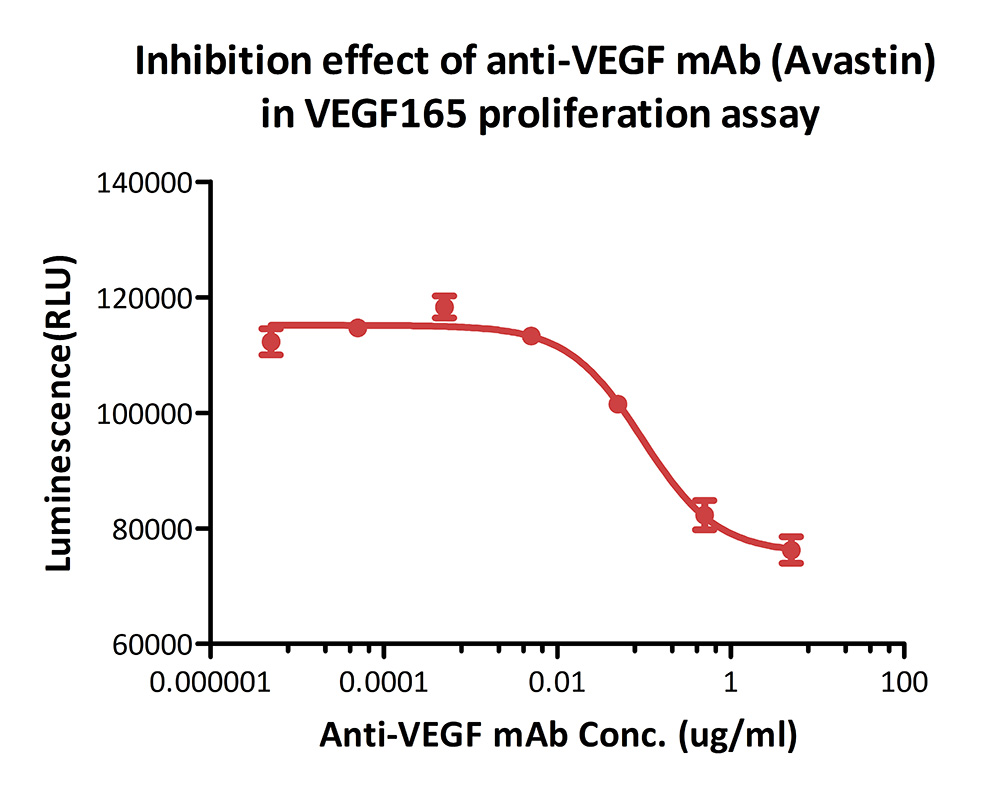
Inhibition assay shows that the proliferation effect of ActiveMax® Human VEGF165, Tag Free (MALS verified) (Cat. No. VE5-H4210) is inhibited by increasing concentration of anti-VEGF mAb (Avastin). The concentration of VEGF165 used is 20 ng/mL. The ED50 is 0.065-0.229 μg/mL (Routinely tested).
CHLOROTOXIN AGENTS AND USES THEREOF
Authors: Mcgonigle Sharon,Majumder Utpal,Postema Maarten H. D.
Cited Product: VE5-H4210
Journal: US20200206312A1 2020
Application: Binding Assay
CHLOROTOXIN AGENTS AND USES THEREOF
Authors: Mcgonigle Sharon,Majumder Utpal,Postema Maarten H. D.
Cited Product: VE5-H8210
Journal: US20200206312A1 2020
Application: Binding Assay
FGF primes angioblast formation by inducing ETV2 and LMO2 via FGFR1/BRAF/MEK/ERK
Authors: Chen PC, Hsueh YW, Lee YH, et al.
Cited Product: VE5-H4210
Journal: Cell Mol Life Sci 2020
Application: Flow cytometry
Authors: Meng Wang, Youke Qi, Yongning Sun
Cited Product: VE5-H5248
Journal: BioMed Research International 2020
Application: SPR
Biophysical characterization platform informs protein scaffold evolvability
Authors: Golinski AW, et al
Cited Product: VE1-H82E7
Journal: ACS COMB SCI 2019
Application: Binding Assay
Authors: F Corti, et al
Cited Product: VE5-H8210
Journal: Nat Commun 2019
Application: ELISA
Neuropilin-1 drives tumor-specific uptake of chlorotoxin
Authors: McGonigle S, et al
Cited Product: VE5-H8210
Journal: Cell Commun Signal 2019
Application: BLI
Methods of producing glycosylated proteins
Authors: ML Wetter, et al
Cited Product: VE5-H4210,VE1-H5220
Journal: US20180354997A1 2018
Application: SPR
Neuropilin-1 mediates Neutrophil Elastase uptake and cross-presentation in breast cancer cells
Authors: Kerros C, et al.
Cited Product: VE5-H5248
Journal: J Biol Chem 2017
Application: BLI
A biosynthetic route for polysialylating proteins in Escherichia coli
Authors: Keys TG, et al.
Cited Product: VE5-H4210,VE1-H5220
Journal: Metab Eng 2017
Application: SPR
In vitro Fab display: a cell-free system for IgG discovery
Authors: Stafford RL, et al.
Cited Product: VE1-H4213
Journal: Protein Eng Des Sel 2014
Application: SPR(Biacore T200)
This web search service is supported by Google Inc.








